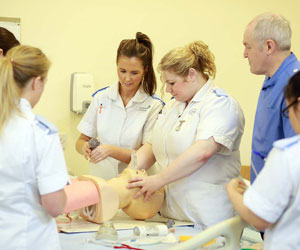Module Overview
The aim of this module is to enable you to develop your personal leadership style, professional identity and leadership behaviours.
The module explores the use of transformative learning techniques to enhance both your professional development and impact within your organisation. It includes the concepts and theories behind transformative learning and transformative reflection.
This will enable you to develop and use reflective practices, which are fundamental to the rest of the academic programme.
Course outline
Course summary
The module explores professional identity in a leadership context, and covers the context of the development of both self as a leader and followers. You will be introduced to the theories and practices of contemporary leadership, such as distributed leadership, compassionate leadership and transformative learning. The use of alternative contemporary approaches for personal and professional transformation and leadership will be explored, including the development of reflective practice.
Content – Overview, Context, Models, Reflection
- Formative Reflection 2,000 words – Critique and Reflective models
- Content Theories of Leadership and management
- Videos – Course team and Vimeo/Youtube
- Course textbook/Journal articles – formative reflection on selected article
- Theory and experiential learning
- Critical Professionalism – work based learning and review
- Summative Reflection – application of learning, current professional perspective, development plan and ongoing plans for professional development and enhanced practice.
Students who successfully complete this module as a stand-alone module will be eligible for a University transcript of credit.
Study as stand alone or in series
This module may be studied as a one off stand alone module, or in series with the wider Organisational and Industrial Leadership Programmes for which it was created to develop transformative leadership and management skills in both technical and non-technical sector organisations and enable career progression.
See: www.cumbria.ac.uk/study/courses/postgraduate/industrial-leadership/pgc/
Modules
Programme Specification
Assessment, Feedback, and Teaching and Learning methods
Full details are available in the programme specification.
Timetables
The teaching timetable should be available from the end of August. Access to the timetable is through the Student Hub – you will be able to access the Student Hub after you have completed online registration. The teaching day is 9am to 6pm, Monday to Friday; please keep your other commitments open until confirmation of your teaching timetable, and bear in mind that many courses will offer placements or fieldwork which sometimes extends into the evenings and weekends.
Entry requirements
Have a question about our entry requirements?
Entry Requirements
See course specific entry requirements listed below.
More information about levels and credits.
Selection criteria
In order to be eligible to study this module, students should have access to a suitable practice-based setting.
Non UK degree candidates must be working at team leader or equivalent in industry. Naric database to inform equivalence to UK honours degree.
Applicants with non-standard qualifications but substantial engineering experience may be invited to interview to present their portfolio of experience.
If applicant’s 1st language is not English, English Language test to level of IELTS 6.5 (min 5.5 for each band) is required, or the UoC English assessment programme prior to joining the programme.
Application information
Applications should be made online directly to the University using the link on this page, or contact enquirycentre@cumbria.ac.uk for details and guidance. There is no official closing date but we would encourage you to apply as early as possible, as many courses are competitive.
Student finance
We have a wide range of scholarships, bursaries, grants and funds available to support you throughout your studies with us. This includes the Cumbria Bursary - a non-repayable bursary designed to support first year students with a household income of less than £25,000..
Student FinanceResources and facilities
We place a high degree of emphasis on interactive learning within the Business School and provide a supportive environment in which you can develop academically and personally. Resources are available to students through the Library's One Search service. One Search is an easy to use, powerful discovery service that searches the university's journal collections, bibliographic databases and library catalogue from one search box. Additional resources will be made available through the university virtual learning environment.






